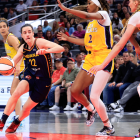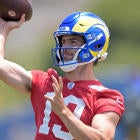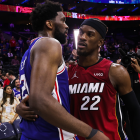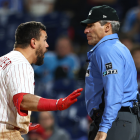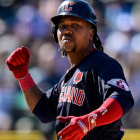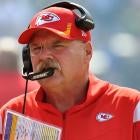
If you have not seen Manchester City's 3-0 win over Manchester United at Old Trafford on Sunday then not to worry. It is a game you will have seen dozens of times before. Pep Guardiola's apex predators come across an opponent so far from their level that they cannot help but indulge themselves for a time, playing with their prey before striking the decisive blows. For the team supposedly bound to generate a billion dollars in revenue a few years from now, just read Fulham, Red Star Belgrade or Young Boys.

Golazo Starting XI Newsletter
Get your Soccer Fix from Around the Globe
Your ultimate guide to the Beautiful Game as our experts take you beyond the pitch and around the globe with news that matters.
Thanks for signing up!
Keep an eye on your inbox.
Sorry!
There was an error processing your subscription.
Given that it is perhaps not as hard as one might assume to buy into Erik ten Hag's post match assessment of his side's performance. The plan, he insisted, had gone as he wanted, at least in the first half. This was a plan where United had created little more than a few half counters, moments to get Old Trafford up on their feet in hope rather than expectation, and given up prime chances beyond the contentious penalty that Rasmus Hojlund conceded. On another day that might not have been given. On another day Andre Onana might not have saved well off headers from Erling Haaland and Phil Foden or the former might have turned in the rebound when the latter was denied.
This is what happens when you run into the best of the best. Alternative narratives snap through your mind: we would have gotten away with it if it wasn't for that pesky VAR. In the cold light of day, however, you have to conclude that when you have given up exactly four expected goals (xG) and three actual ones, when you have been outshot 21 to 7, when John Stones completed more passes in your penalty area than the entire United team did in City's -- almost every other branching timeline ends in defeat too. Ten Hag's best laid plans might not have accounted for much anyway.
More concerning than this one-off match against a superior opponent is how Ten Hag views the sweep of his side. Here two particular post match talking points land with thudding concern, none more so than his insistence that the overall trajectory of his United side is upwards. Asked whether he was happy with the direction his team was heading, the Dutchman said,"You ask that after today's game against City, but the three games before we won and the spirit is very good, the fighting spirit is very good. So, yeah, I think we are on the way up.
"The start [of the season] was difficult, but we are on the way up."
Now, naturally, Ten Hag could hardly come out and say that his side are in a death spiral and it's all his fault but if managers attempt to sell a story grounded in illusion then they are only going to make matters worse for them. To use their three wins prior to the derby to buttress claims for progress does not suggest he's a coach that demands such high standards from his players while having similar expectations of himself. For over an hour they trailed to Brentford before Scott McTominay pulled a rabbit out of the hat. Points were nearly dropped to Sheffield United and Copenhagen. If that constitutes progress then the bar is set too low.
Equally perplexing, Ten Hag's insistence to Dutch TV that "the football that we played at Ajax, we will never play here." Once more he chose to emphasize his vision for United to be a team that plays on the counterattack having said over the summer that he wanted his players to become "the best transition team in the world." An admirable vision for United, even if they did hire him for the possession and pressing work he did at Ajax (if they wanted elite transition, would they not have picked a coach in the mold of Antonio Conte?).
Imagine, however, that Ten Hag's vision is brought to life in glorious technicolor. United get Marcus Rashford back into last season's groove and Bruno Fernandes brings more than the petulance which too often characterises his biggest matches. That team will immediately need a plan B, something they can fall back on when opponents swiftly conclude that they are not going to risk committing men forward and getting undone on the counter. Already, teams like Sheffield United and Copenhagen do that; they are to Manchester United what Manchester United are to Manchester City. How many times in the current manager's reign has this team ground down an opponent camped in its penalty area?
That the batterings of the lesser teams are so infrequent goes at least some way to explain why Ten Hag's Premier League results look so much less rosy when you start tinkering under the hood. United might have the joint-third most points in the top flight since his appointment (their 90 is 18 fewer than Arsenal and 23 less than Manchester City) but over 48 games they have a goal difference of +10, half that of Tottenham, a sixth of Arsenal's. The ninth best attack in terms of goals scored and the 10th best in terms of goals conceded -- sixth and 11th in terms of non-penalty xG for and against -- somehow contriving to deliver the third most points? It could never last.
Individual talent and a penchant for late dramatics can only get you so far but where, as Gary Neville asked even as he staunchly defended Ten Hag, are the "repeated patterns" that you see whenever you watch City, Arsenal or Liverpool? All those teams have transition as a feather in their bow, not the underpinning of their footballing identity.
Now would be the stage where Neville would note how challenging an environment Ten Hag has been thrust into. He would be entitled to do so. For most of the manager's tenure, Manchester United has been on the market. Facilities that were best in class when the Glazers bought the club have atrophied. What little structure there is above the head coach has been consistently found wanting when United have had to make profound decisions on and off the pitch. The waste in the market of years gone by has hampered the club's ability to round out his squad. United's bench, from which the likes of Anthony Martial and Sergio Reguilon entered on Sunday, doesn't just look sub par compared to City. Would you rather bring on those players or Diego Carlos, Youri Tielemans and Leon Bailey, as Unai Emery did for Aston Villa earlier in the day?
It might be a near-impossible job to restore United to where they were in the Sir Alex Ferguson glory days. That does not mean that there are not minimum standards that Ten Hag is not hitting. The void around him has enabled the Dutchman to recruit from the player pool he knows. Over $400 million has been spent on the likes of Mason Mount, Antony, Casemiro and Andre Onana. Even the best investments might just be qualified successes such as Lisandro Martinez. If Ten Hag were to go you suspect his successor would be keen to clear out many of these recent signings. That is easier said than done at Old Trafford.
For now, there has been no indication from sources close to United that the club are considering parting ways with Ten Hag, who banked significant credit by winning last season's EFL Cup and qualifying for the Champions League. Sir Jim Ratcliffe may be intending to overhaul the football department but when it became apparent he had won the race to secure a stake the messaging from his camp was that the manager was not one of those who might soon be out of work.
However, it is certainly time for those backing Ten Hag to ask questions. How differently would they assess the last season and change if Rashford had not caught lightning in a bottle for a few months? Would the ceiling be raised by better luck with injuries? Does the manager's long-term vision for United's play style gel with their own? Is there a better man for the job out there? And, perhaps most of all, is it not a cause for concern when you find yourself asking so many questions over the suitability of your manager when he's more than a year in?














